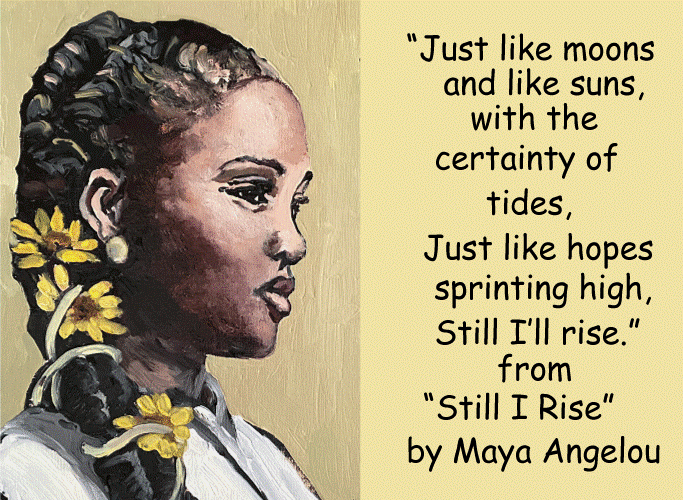Still, I Rise Summary & Analysis By Maya AngelouAbout AuthorMaya Angelou, originally named Marguerite Annie Johnson (April 4, 1928 - May 28, 2014), was an influential American figure known for her memoirs, captivating poetry, and activism in the civil rights movement. Throughout her prolific career spanning over five decades, she authored seven autobiographies, three essay collections, and numerous volumes of poetry. Additionally, she made notable contributions to the realms of plays, movies, and television shows. Angelou's remarkable achievements garnered her numerous awards and an impressive collection of over 50 honorary degrees. 
Angelou's autobiographical works, in particular, hold significant acclaim. Her debut memoir, "I Know Why the Caged Bird Sings" (1969), delves into her childhood and formative experiences, capturing international attention and admiration for its powerful storytelling. The publication marked a turning point in her career and propelled her into the global spotlight. The Theme Of The Poem"Still, I Rise" explores various themes, including oppression, resilience, race/racism, and sexism. OppressionOppression is a prominent topic in the poem, as it delves into the history of suffering endured by black people and condemns the white oppressors. The poet's determination to overcome hardship and resist tyrants honors the legacy of her ancestors who were enslaved. ResilienceResilience is another key theme discussed in the poem, highlighting the struggle and triumph against racism throughout history. The poet displays a tenacious and combative attitude, refusing to give up and affirming her resolve to rise above adversity. The connection between oppression and racism is significant in the speaker's narrative. The reference to herself as a "black ocean" explicitly alludes to race and emphasizes the link between racial differentiation and the dichotomy between "you" and "I" in the poem. The poet denounces racism and champions the universal concept of overcoming prejudice regardless of one's background or skin color. SexismSexism can also be inferred in the poem, as the speaker's defiance may be fueled by her gender (presumed to be female). While the metaphorical language primarily focuses on the subjugation of black males and girls, the speaker's confidence in her sexuality and provocative "dancing" signifies an empowered female presence. By embracing her sexuality and rejecting male oppression, she fights against discrimination based on both race and gender. SummaryIn "Still, I Rise," Maya Angelou skillfully employs wordplay from the start, addressing both the historical narrative and the personal significance of her people. She cleverly intertwines "Write down in history" to encompass the recording of her community's story and the amplification of her own achievements. Despite potential ridicule and mistreatment faced by African-Americans, Angelou asserts her resilience, likening herself to the rising dust from a boot's impact, determined not to be overcome. Continuing into the second stanza, Angelou directly challenges the listener's reaction. She confidently embraces her sexuality, self-assurance, and beauty, questioning whether they find it troubling. Her presence exudes confidence, comparable to the abundance of an oil baron. Furthermore, she affirms her commitment to rise, much like the unwavering sun and moon that persist through each day and night, embodying the enduring aspirations for a better future despite adversity. The moon allusion in the poem hints at the predictable tides caused by its gravitational pull on Earth's oceans, symbolizing constancy and dependability, much like the daily cycle of sunrise and sunset. 
The fourth stanza introduces a series of interrogatives. Angelou suggests that the intended recipient's desires crush her spirit. However, she defiantly holds her head high in the fifth stanza, refusing to bow down in surrender or defeat. Her laughter reflects a sense of assurance and self-confidence akin to possessing gold mines in one's backyard and unimaginable wealth. In the sixth stanza, Angelou asserts her defiance, likening the rising resilience of herself and fellow black individuals to the natural and effortless movement of air. Despite facing hateful attitudes, cruel words, and unkind looks, they rise, buoyant and weightless. The seventh stanza revisits the notion of sassiness, now transformed into overt sexiness. Angelou's confident swagger persists, with the imagery of diamonds adorning the "meeting" of her "thighs." The material and affluent aspects converge with the corporeal and sexual, exemplifying her empowered presence. Departing from the quatrain structure, the final fifteen lines of the poem repeat the refrain "I rise." Angelou emphasizes that she and others have emerged from the "huts of history's shame" that encapsulate the mistreatment of black people throughout time. She, akin to a resilient "black ocean," endures and weathers life's turbulent changes, embodying strength, vibrancy, and expansiveness. Indeed, a new dawn, brighter and more hopeful, emerges as she leaves behind the dark periods of "terror and fear." This transformation is the realization of the dreams held by her ancestors who endured generations of racial prejudice as slaves. The struggles and activism of Civil Rights pioneers, including Angelou herself, have brought forth this long-awaited era?a precious "gift" bestowed upon her. ConclusionMaya Angelou's poem "Still I Rise" carries a profound message of resilience, defiance, and triumph against oppression and adversity. Through vivid imagery, clever wordplay, and an unwavering tone, Angelou captures the enduring spirit of marginalized communities and their unwavering determination to overcome obstacles. The poem explores themes of oppression, resilience, race/racism, and sexism, shedding light on the historical struggles faced by black individuals while emphasizing the universal significance of conquering prejudice in all its manifestations. Angelou's words radiate strength and empowerment as she firmly declares her refusal to succumb, her unwavering confidence, and her celebration of both her race and gender identity. "Still I Rise" serves as a resounding call to action, inspiring readers to persevere, embrace their intrinsic worth and power, and reject the confines imposed upon them. It stands as a constant reminder that despite the challenges encountered, one can rise above and flourish. Maya Angelou's poignant verses continue to reverberate, serving as a reminder of the resilience inherent within every individual and urging all to stand tall, unyielding, and proud. Her legacy as a poet, memoirist, and advocate for civil rights endures, perpetually inspiring future generations.
Next TopicSummary of Candida by G. B. Shaw
|
 For Videos Join Our Youtube Channel: Join Now
For Videos Join Our Youtube Channel: Join Now
Feedback
- Send your Feedback to [email protected]
Help Others, Please Share









